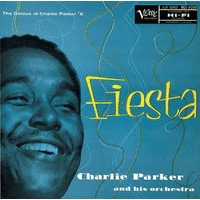Cal Massey's song "Fiesta" had been recorded by Charlie Parker and when John Coltrane recorded his first album under his own name the title piece was Cal Massey's "Bakai" Allmusic contains a list of the albums that contain compositions by Cal Massey.
The Cal Massey Story
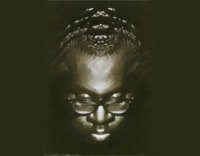 Calvin ("Cal") Massey was born January 11th, 1927. His parents had seperated by the time Cal was one year old. Raised in Pittsburgh by his mother, the young Calvin was told that his father had died. Around his tenth or eleventh birthday his stephfather gave him a pawn shop-bought trumpet. At that time Cal would sneak out of the house to go listen to the bands that were playing in town such as at the Lodge Hall near his home where he heard Erroll Garner for the first time. At the age of fifteen Cal left home to go on the road with a band but stranded in Kansas and had to wire his mother to send him money to return home.
Calvin ("Cal") Massey was born January 11th, 1927. His parents had seperated by the time Cal was one year old. Raised in Pittsburgh by his mother, the young Calvin was told that his father had died. Around his tenth or eleventh birthday his stephfather gave him a pawn shop-bought trumpet. At that time Cal would sneak out of the house to go listen to the bands that were playing in town such as at the Lodge Hall near his home where he heard Erroll Garner for the first time. At the age of fifteen Cal left home to go on the road with a band but stranded in Kansas and had to wire his mother to send him money to return home.
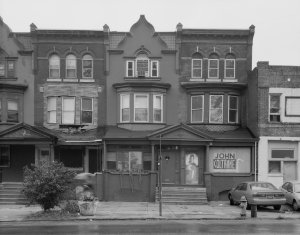 One day - still in his teens- after his mother revealed that his father was not dead, Cal left for Philadelphia to look for him. When he walked the streets he heard the sound of an alto played with enormous strenght coming from a basement. Drawn to the sound Cal went in and met what would become his lifetime compagnion in music; John Coltrane. Both still in their teens they lived at Coltrane's mother's house and played and talked music all day long.
They were so close that when Cal and his girfriend Charlotte decided to elope, Charlotte also moved in and they both lived in Coltrane's house in Philadelphia. The 1950's was a hopeful decade. People like Thurgood Marshall, Rosa Parks, Martin Luther King jr each successfully battled against segregation. Philadelphia's bebop scene was blossoming. Cal Massey's touring days where over and he started his own band with Albert Heath on drums, Jimmy Garrison on bass,
"C" Clarence Sharpe on alto sax and a seventeen-year-old pianist named McCoy Tyner.
Cal Massey's name as a composer grew, his song "Fiesta" had been recorded by Charlie Parker and when John Coltrane had the chance to record his first album as a leader the title piece was Cal Massey's "Bakai". By the late 1950's Cal and Charlotte were able to buy their own house in Brooklyn where they raised their five children. Most of the income was earned from orchestrations and recordings. In 1961 Coltrane called upon his friend Massey to do orchestrations for Africa Brass, among the recordings was Cal's composition "The Damned Don't Cry" conducted by Romulus Franceschini. Romulus was a soft-spoken Italian-American composer, who could write beautiful string arrangements, he was ten years Cal's senior and they teamed up to form the RoMas orchestra.
One day - still in his teens- after his mother revealed that his father was not dead, Cal left for Philadelphia to look for him. When he walked the streets he heard the sound of an alto played with enormous strenght coming from a basement. Drawn to the sound Cal went in and met what would become his lifetime compagnion in music; John Coltrane. Both still in their teens they lived at Coltrane's mother's house and played and talked music all day long.
They were so close that when Cal and his girfriend Charlotte decided to elope, Charlotte also moved in and they both lived in Coltrane's house in Philadelphia. The 1950's was a hopeful decade. People like Thurgood Marshall, Rosa Parks, Martin Luther King jr each successfully battled against segregation. Philadelphia's bebop scene was blossoming. Cal Massey's touring days where over and he started his own band with Albert Heath on drums, Jimmy Garrison on bass,
"C" Clarence Sharpe on alto sax and a seventeen-year-old pianist named McCoy Tyner.
Cal Massey's name as a composer grew, his song "Fiesta" had been recorded by Charlie Parker and when John Coltrane had the chance to record his first album as a leader the title piece was Cal Massey's "Bakai". By the late 1950's Cal and Charlotte were able to buy their own house in Brooklyn where they raised their five children. Most of the income was earned from orchestrations and recordings. In 1961 Coltrane called upon his friend Massey to do orchestrations for Africa Brass, among the recordings was Cal's composition "The Damned Don't Cry" conducted by Romulus Franceschini. Romulus was a soft-spoken Italian-American composer, who could write beautiful string arrangements, he was ten years Cal's senior and they teamed up to form the RoMas orchestra.
Still life as a musician was hard; there was never a steady income.
One day Cal tried to talk to one of the co-owners of Blue Note in what we now would call
an elevator pitch. Cal was so frustated by the non-listening attitude of the executive that upon exiting the elevator he kicked him. This executive in turn put Cal on a blacklist and from that moment on it was merely impossible for Cal to get any work in the music business.
Not the man to be put down easily he began to produce his own concerts. He would take his music directly to the people, he said. He started to give concerts at his own house featuring his daughter Waheeda singing and his son Zane on saxophone. He also organized benefit concerts at the st. Gregory's Church right across the street. Concerts that featured names as Rashaan Roland Kirk, Thelonious Monk, Elvin Jones and of course John Coltrane. But things would get worse, on July 17 1967 John Coltrane died from liver cancer at the age of 40. The bulletin for the service bore the title "A Love Supreme" and the text of that poem was read aloud by Cal Massey.
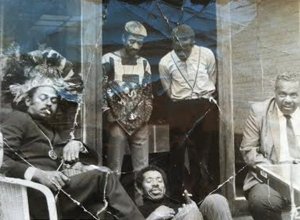 On April fourth 1968 Dr Martin Luther King was shot dead on a balcony of the Lorraine Motel in Memphis Tennessee.
Halfway during the sixties Cal Massey got involved with musicians that had a more radical attitude towards black liberation, one of them was a saxophone player called Archie Shepp. Shepp and Massey worked together on Attica Blues, which was released in 1972, the last song on the album was Cal Massey's Quiet Dawn sung by his daughter Waheeda.
Cal got involved with the black panthers and during the Pan African Festival in Algiers he paid a visit to one of their early leaders, Eldridge Cleaver, who lived there in exile. During this visit Cleaver asked Cal Massey to write the Black Liberation Movement Suite dedicated to black leaders. Cal compiled this suite of some of his best work and wrote pieces dedicated to Malcolm X, Cleaver himself, dr Marten Luther King, Huey P. Newton and John Coltrane. Back in Brooklyn Massey organised a series of historic benefit concerts to help the Black Panthers party of which 21 members were at trial. The first benefit concert being right round the corner from his own home premiered Massey's Black Liberation Movement Suite.
During his life Cal Massey's health had deteriorated. He lost a kidney from tuberculoses and gained a lot of weight. He knew he was going to die and he wanted to write one more epic work. A black revolutionary opera spanning time from slavery to the future. Cal Massey died on October 25 1972 at the age of fourty-five. The day of his death was the opening of a new musical play "Lady Day, a musical tragedy". This musical had two Cal Massey songs, "Come let me love you by the Sea" and "What would it be without you". Songs that showed off another talent of Cal Massey, being that of a great lyricist. Unfornately, this songs were never recorded by the great vocalists of his time.
On April fourth 1968 Dr Martin Luther King was shot dead on a balcony of the Lorraine Motel in Memphis Tennessee.
Halfway during the sixties Cal Massey got involved with musicians that had a more radical attitude towards black liberation, one of them was a saxophone player called Archie Shepp. Shepp and Massey worked together on Attica Blues, which was released in 1972, the last song on the album was Cal Massey's Quiet Dawn sung by his daughter Waheeda.
Cal got involved with the black panthers and during the Pan African Festival in Algiers he paid a visit to one of their early leaders, Eldridge Cleaver, who lived there in exile. During this visit Cleaver asked Cal Massey to write the Black Liberation Movement Suite dedicated to black leaders. Cal compiled this suite of some of his best work and wrote pieces dedicated to Malcolm X, Cleaver himself, dr Marten Luther King, Huey P. Newton and John Coltrane. Back in Brooklyn Massey organised a series of historic benefit concerts to help the Black Panthers party of which 21 members were at trial. The first benefit concert being right round the corner from his own home premiered Massey's Black Liberation Movement Suite.
During his life Cal Massey's health had deteriorated. He lost a kidney from tuberculoses and gained a lot of weight. He knew he was going to die and he wanted to write one more epic work. A black revolutionary opera spanning time from slavery to the future. Cal Massey died on October 25 1972 at the age of fourty-five. The day of his death was the opening of a new musical play "Lady Day, a musical tragedy". This musical had two Cal Massey songs, "Come let me love you by the Sea" and "What would it be without you". Songs that showed off another talent of Cal Massey, being that of a great lyricist. Unfornately, this songs were never recorded by the great vocalists of his time.
During the years people who knew Cal Massey and his work tried hard to keep his music alive. Archie Shepp and later Fred Ho
both played and kept playing and recording Cal Massey Songs.
From Cal Massey's lifetime to the Cal Massey Songbook is a leap of over forty years.
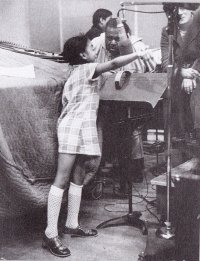 The Cosmic Surf Club guided by Cal Massey's son Zane Wayne Massey time-travelled back to those days in Brooklyn. Working with the family's home recordings and deciphering all the words sung by Cal Massey's daughter Waheeda they reconstructed the lost songs. Thanks to the loving support from the Massey family and the crowdfunders who believed in this project it's now possible to hear Cal Massey's songs with the lyrics that he wrote for them. What's so incredible is that despite all the struggle and tough times his music sounds so positive and radiates such peace and compassion. You could say Cal Massey was a true gentleman.
The Cosmic Surf Club guided by Cal Massey's son Zane Wayne Massey time-travelled back to those days in Brooklyn. Working with the family's home recordings and deciphering all the words sung by Cal Massey's daughter Waheeda they reconstructed the lost songs. Thanks to the loving support from the Massey family and the crowdfunders who believed in this project it's now possible to hear Cal Massey's songs with the lyrics that he wrote for them. What's so incredible is that despite all the struggle and tough times his music sounds so positive and radiates such peace and compassion. You could say Cal Massey was a true gentleman.
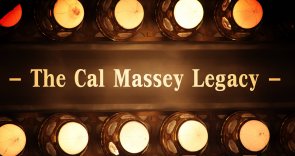 The legacy of composer Cal Massey contains recordings by great artists such as Charlie Parker, John Coltrane and
Archie Shepp.
This performance will take you to Brooklyn in the 1960's. Unreleased home recordings, photographs and live music with singer
Saskia Jonker and Maxim Baghuis on keys. Saxophone player Zane Wayne Massey will deliver you the story of his
father's life in words and music.
The legacy of composer Cal Massey contains recordings by great artists such as Charlie Parker, John Coltrane and
Archie Shepp.
This performance will take you to Brooklyn in the 1960's. Unreleased home recordings, photographs and live music with singer
Saskia Jonker and Maxim Baghuis on keys. Saxophone player Zane Wayne Massey will deliver you the story of his
father's life in words and music.

